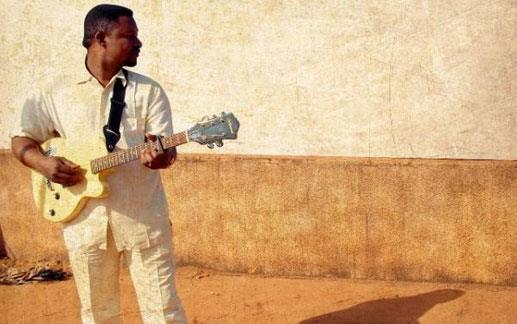Malian singer, guitarist and composer Samba Touré has returned with his third solo album, Albala. While Touré first came to prominence playing with legendary Malian musician Ali Farka Touré, in the 10 years since Samba's debut album Foro, he has attracted fans from across the globe with his assured and mature style. This character is far from lacking on Albala, and Touré's hypnotic guitar grooves, unshakable vocals and commanding lyrics raise the music to a level of profound artistry. Recorded in Bamako during the autumn of 2012, Albala features regular band members Djime Sissoko (ngoni), Madou Sanogo (congas), as well as guests Zoumana Tereta (sokou, traditional violin), Aminata Wassidje Traore (vocals “Fondora”), and Hugo Race (guitar and keyboards).
While Mali has long been known for its stunning musical output, in the last year it has attracted attention of another sort all together, the result of the civil and political unrest that has gripped the nation. Islamist militants in northern Mali banned music for several months which sent many musicians into exile, and shook Mali's musical community to the core. But for the majority of Malians, a world without music is unimaginable, and a number of the country's most prominent names- including Vieux Farke Touré and Fatoumata Diawara- have releases dealing directly with the political situation. This holds true for Samba Touré as well, and his resistance and defiance are showcased in Albala.
Touré's music expertly incorporates traditional West African instruments like the ngoni and the sokou, along with the dark timbre of his voice into each song. The album shares many similarities with much of the Malian guitar music currently being played, and it's hard to miss the influence of Ali Farka Touré's on Samba Touré's sound. However, the soft, almost lullaby-like feel of Albala allows the listener to really focus on the impressive power of Touré's lyrics.
For the most part, Touré’s lyrics are rooted in social and political issues, as each song communicates a thoughtful message. The album title Albala (meaning “danger”) sets the tone for the record, as Touré cautions us about our decisions and our future. In “Fondora” (Leave Our Road), a song against any form of violence in North Mali, Touré sings “…leave our road/All killers, leave our road/Thieves, leave our road/Looters, leave our road/Rapists, leave our road/Betrayers, leave our road.” “Fondora” also features Zoumana Tereta on sokou, a sound which surprisingly sounds less like a typical Western stringed instrument and more like a nasal wind instrument.
Track three, “Aye Go Mila” (I only think about her) is a beautiful love song, and consequently one of the few uplifting tunes (lyrically) on the album. Consistent with the rest of the album, the lyrics in this song are thoughtful, introspective, and powerful. Touré sings: “Love is really powerful/Love holds us/If you’re not here I feel punished/So I walk further to find you.” Instead of showy, overly- virtuosic guitar playing, Touré’s steady, hypnotic groove allows attention to be drawn to the lyrics.
Impressively, Samba doesn’t complicate the title track “Albala” with lyrics, letting the music speak for itself. It’s repetitive, simple, and contemplative. Because of its meditative flow, it gives the listener the opportunity to sit with the themes raised by the rest of the album.
Be sure to check out this album now—and to listen with the translated lyrics in hand! Samba Touré welcomes all to listen, and his opening song of celebration, “Be Ki Don” urges us all to gather, dance, sing, and welcome him. We're glad that he has!









